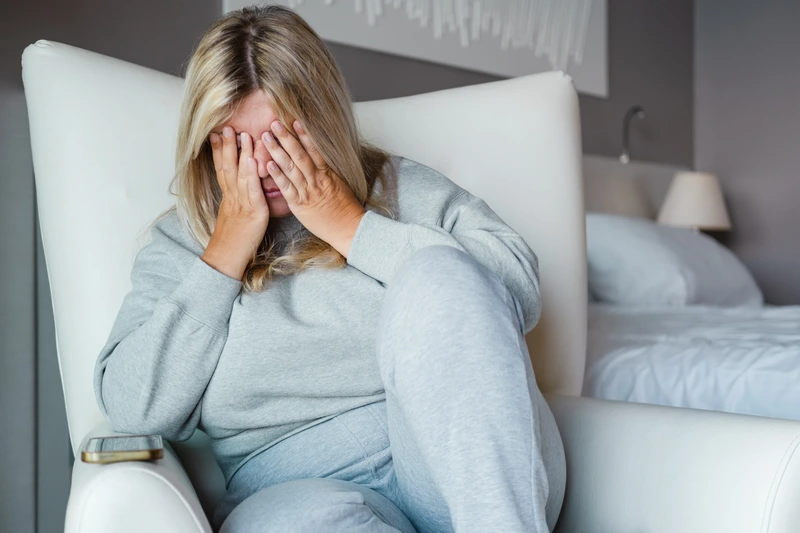Sleep disturbances are a common issue during menopause, affecting roughly 40% to 50% of women in their 40s and 50s. Fluctuations in estrogen and progesterone levels often play a role in these disruptions. Menopause introduces profound hormonal, physical, and psychological shifts, with low hormone levels frequently contributing to insomnia. These changes can interfere with sleep cycles and overall restfulness, leading to problems like elevated body temperatures, increased anxiety, and mood swings. Hormone replacement therapy (HRT) may offer relief by replenishing estrogen and progesterone levels, which can help alleviate menopausal symptoms like insomnia.(1)(2)(3)(13)
The Importance of a Good Night’s Rest
A good night’s sleep is more than just a luxury; it’s essential for well-being and hormone balance. Quality sleep supports healthy skin, hair, mood, metabolism, and energy levels. For many women, maintaining optimal levels of hormones like estrogen, progesterone, DHEA, and testosterone is crucial for sustaining overall well-being and vitality.(1)(4)
The benefits of a good night’s sleep include the following:(4)(5)
Balanced hormone levels to support various bodily functions
Enhanced skin and nail health
Improved stress management and mood stability
Lower risk of hypertension, stroke, and heart problems
Better appetite regulation and diabetes control
Enhanced memory, creativity, and physical fitness
Strengthened immune system and reduced risk of dementia
The Four Stages of Sleep
Sleep quality can be assessed by the time spent in each of the four stages: rapid eye movement (REM) sleep and three stages of non-rapid eye movement (NREM) sleep.(6)(7)
NREM Stage 1: This is the transition from wakefulness to sleep, usually lasting around five minutes.
NREM Stage 2: During this stage, the body temperature drops and the heart rate slows. It lasts around 20 minutes.
NREM Stage 3: This is deep sleep, where muscle relaxation and tissue repair occur.
REM Sleep: In this stage, the brain becomes more active, which is crucial for memory and creativity.
It’s important to note that sleep cycles do not follow a linear progression. After Stage 3, the body often returns to Stage 2 before entering REM sleep. A lack of REM sleep can leave individuals feeling less rested and refreshed.(6)(7)
Which hormones affect sleep?
The human body produces more than 50 hormones that regulate various functions, including sleep. Estrogen and progesterone play critical roles in this regulation, and imbalances in these hormones can disrupt sleep quality and duration.(1)(3)
Estrogen and progesterone can subtly affect brain activity during different stages of sleep. Being “asleep” means different things, depending on the stage. In deep NREM sleep, for example, the body repairs tissues, builds muscle and bone, and strengthens the immune system.(1)(3)(5)(13)
In addition to estrogen and progesterone, melatonin also plays a key role in sleep regulation. Often referred to as the “sleep hormone,” melatonin helps regulate the body’s circadian rhythm by signaling when it’s time to sleep. Melatonin levels naturally decline with age, making it harder to fall or stay asleep, especially in menopausal women.(8)(9)

Estrogen and Sleep Disturbances
Estrogen is vital for sleep regulation, particularly in maintaining body temperature, regulating serotonin, and supporting the production of neurotransmitters like melatonin. When estrogen levels fluctuate, insomnia and a reduction in deep sleep may occur.(1)(3)
High Estrogen Insomnia
Periods of elevated estrogen, such as during pregnancy or hormone therapy, can lead to insomnia. Increased estrogen levels may raise cortisol, the stress hormone, which can interfere with the ability to fall or stay asleep. High estrogen levels can also overstimulate the body, increasing body temperature and further disrupting sleep.(1)(3)
Low Estrogen Insomnia
Conversely, low estrogen levels can result in a reduction in deep sleep and poor overall sleep quality, often leaving individuals feeling fatigued despite a full night’s rest. This is especially common during menopause when reduced estrogen affects the body’s ability to regulate temperature, leading to frequent awakenings due to hot flashes and night sweats. Lower estrogen levels are also associated with mood disturbances, which can further impact sleep.(1)(3)
Progesterone and Sleep Disturbances
Progesterone, often called the “relaxing hormone,” has sedative properties that help promote restful sleep. However, fluctuations in progesterone, particularly during menopause, can lead to night sweats, hot flashes, and difficulty falling asleep. When combined with low estrogen, these hormonal changes can result in reduced deep sleep and chronic insomnia.(1)(3)(10)
Many women begin experiencing these hormone-related sleep disturbances well before realizing they are approaching menopause. During perimenopause and menopause, it’s common to feel tired earlier in the evening and wake up earlier in the morning, reducing overall sleep time. Although fatigue might seem like it would help with falling asleep, it often triggers a frustrating cycle of insomnia. Fatigue can have various causes and, over time, may lead to more serious health issues. For women over 35, low progesterone levels can be a contributing factor to both fatigue and difficulty achieving restful sleep.(1)(3)(10)(13)
Progesterone plays an essential role in women’s health, particularly in maintaining youthful physical and mental traits. It influences nearly every cell in the body, affecting key areas such as the following:(10)(11)
Mood and well-being
Sleep patterns
Digestion and appetite
Memory and cognitive function
Bone strength
Fat metabolism
Cardiovascular health
To learn more, take a look at the Winona sleep problems symptom page.
Hormonal Insomnia Treatment
HRT is an effective treatment option for managing hormone-related insomnia during menopause. By restoring estrogen and progesterone levels, HRT can help reestablish healthy sleep patterns, promote deeper sleep, and reduce nighttime awakenings. Studies have shown that women undergoing HRT often experience better sleep and may also benefit from improved cognitive function. Additionally, research shows that HRT alleviates hot flashes in up to 90% of menopausal women, leading to fewer sleep disturbances and more restful nights.(1)(11)(12)(13)
How to Increase Sleeping Hormones
In addition to HRT, there are several natural ways to support sleep hormone production:(1)(3)(9)(13)
Adjusting lifestyle habits by reducing caffeine, nicotine, and alcohol intake, especially in the afternoon and evening, as these can affect the central nervous system and disrupt REM sleep quality
Creating a relaxing bedtime routine and managing stress to promote better sleep
Minimizing exposure to blue light from devices like phones, tablets, and televisions, as it can disrupt melatonin production
Fostering a sleep-friendly environment by keeping the bedroom dar
k, quiet, and cool (around 65°F), including using fans for both cooling and white noise
Eating a balanced diet rich in magnesium, tryptophan, and calcium to support sleep hormone production
Avoiding large, spicy, or acidic meals close to bedtime, as they may cause discomfort or trigger hot flashes
Managing hydration by limiting liquids before bed to reduce nighttime bathroom visits
Considering melatonin supplements, which can help regulate the body’s circadian rhythm
Reducing stress through regular exercise, yoga, or relaxation techniques like meditation or deep breathing
Wearing lightweight, breathable sleepwear made from moisture-wicking fabrics, and layering bedding with cooler fabrics to help regulate body temperature
Following a consistent sleep schedule, by going to bed and waking up at the same time each day, and avoiding naps longer than 20 minutes during the day
Managing Menopause-Related Sleep Disturbances
Sleep disturbances during menopause, particularly those resulting from low estrogen and progesterone levels, are common but manageable. Addressing hormonal imbalances with HRT can significantly improve sleep quality and overall well-being. With the right approach, women can find relief from insomnia and its negative effects on mood, energy, and health.
If you’ve entered the menopause transition and are struggling with sleep disturbances, you don’t have to suffer in silence. Take our brief menopause quiz to see if you’re an eligible candidate for HRT. Get started with Winona to take the first step toward feeling better.


